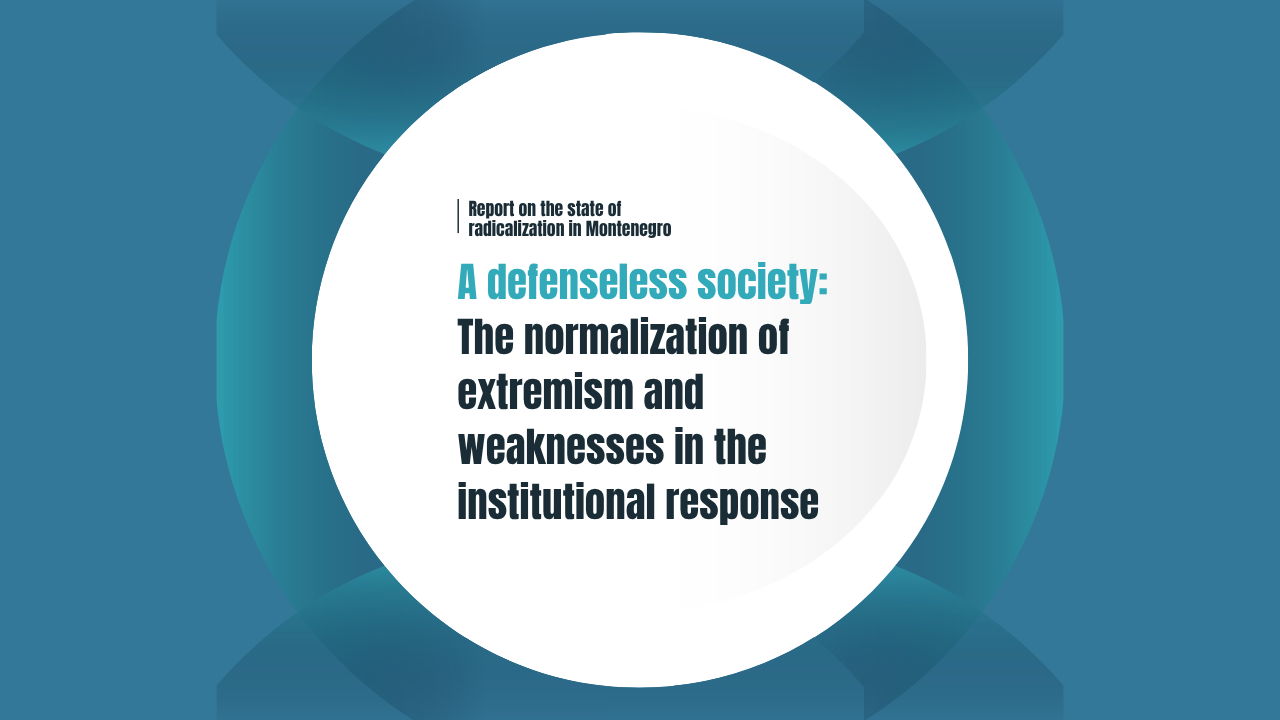Montenegro is facing a serious increase in radicalization and the normalization of extremism, while institutions remain passive, ineffective, or inconsistent in their response, according to a new report by the Center for Democratic Transition (CDT), “A defenseless society: The normalization of extremism and weaknesses in the institutional response.”
In an environment of deep political and ethnic polarization, extremist narratives are no longer confined to the margins. They are becoming an integral part of political discourse, religious messaging, and even institutional frameworks. Hate speech is being tolerated, historical revisionism is becoming institutionalized, and disinformation is shaping public opinion. Instead of a strategic response, the state reacts sporadically and declaratively, leaving the fight against radicalization to the non-governmental sector and international donors.
In 2020, the Government of Montenegro adopted the Strategy for the Prevention and Suppression of Radicalization and Violent Extremism 2020–2024, along with an Action Plan for 2020, but its implementation never followed through, as no new action plans were adopted over the next four years. Although a working group was formed in the summer of 2024 to draft a new strategy for the period 2025–2030, its work has so far yielded no results, and according to current plans, adoption is expected only in the last quarter of 2025. This means that the entire year of 2025 will pass without a valid strategic framework.
The National Operational Team — a body meant to ensure inter-ministerial coordination — was non-functional for an extended period, and the role of national coordinator was held by as many as four different individuals during that time. The result has been a complete break in continuity, loss of institutional memory with every change of government, and the undermining of mechanisms intended to protect society from radicalization.
The results of two public opinion surveys conducted by CDT in November 2024 and May 2025 show deeply rooted ethnic divisions, low trust in institutions, high exposure to hate speech, and an alarming susceptibility to disinformation.
Citizens overwhelmingly identify social media and online portals as the main sources of hate speech, while nearly half believe that the police do not respond effectively, and 60% express distrust in the prosecution service. Around 16% of respondents believe that institutions themselves actively contribute to the spread of religious and ethnic hatred. Nearly one-third of citizens believe that loyalty to their own group is more important than loyalty to the state, and half feel more comfortable among members of their own ethnic community. Particularly concerning is the finding that 45.7% of respondents believe the current socio-political situation should be confronted “by any means necessary,” which opens the door to the acceptance of extremist ideas.
Citizens clearly identify political actors within the country as key drivers of ethnic tensions. Disinformation, historical revisionism, and incendiary narratives originate from the top of the political hierarchy, from religious structures under strong political influence, and from portals operating within a regional propaganda and disinformation network. Such messages are most often disseminated without consequence, with tacit or even open institutional support. This not only fuels divisions, but systematically undermines social cohesion, erodes trust in institutions, and normalizes a constant sense of insecurity.
The report also contains five thoroughly analyzed case studies that show how extremist narratives, hate speech, and disinformation are used for political mobilization and the deepening of social divides. The following cases are analyzed: instrumentalization of the tragedy in Cetinje, spread of false claims about alleged religious extremism following the murders near Bijelo Polje, attempts to rehabilitate the Chetnik movement through statements made by religious leaders, political protection of hate speech in the case of the mayor of Nikšić and disinformation campaigns during the adoption of the resolutions on Srebrenica and Jasenovac.
These case studies further highlight the depth of the problem and underscore the need for a strategic and decisive institutional response.
CDT calls for a serious and long-term change in the approach to combating radicalization in Montenegro. Instead of ad hoc measures and declarative condemnations, it is essential to develop an institutionally grounded, substantive, and applicable strategy that will address the causes — not just the consequences. This includes consistent enforcement of the law, a clear distancing of institutions from extremist narratives, and investment in education, media literacy, and social cohesion.
Otherwise, radical discourse will continue to gain ground in the public sphere, and the absence of institutional response will only reinforce the belief that intolerance and manipulation are legitimate tools of political action.
The full report is available at the link.
Milica Kovačević, Program Director of CDT


